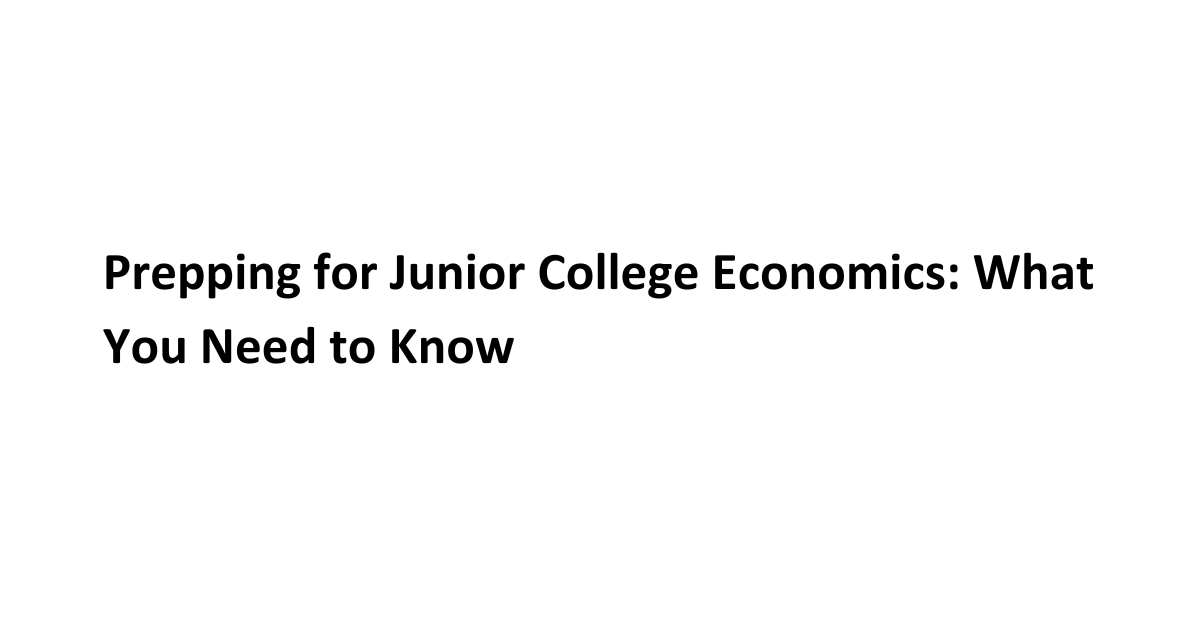
04 Oct Prepping for Junior College Economics: What You Need to Know
When the topic of Junior College Economics arises, many students may feel apprehensive due to the subject’s perceived complexity. Even those proficient in mathematics can find the concepts in Economics challenging to grasp. In Singapore, Economics is a mandatory subject for junior college students, making it a crucial part of their curriculum. Given its complexity, A-level tuition is in high demand, especially for Economics. A tutor can provide personalized guidance tailored to a student’s needs and level of preparation. However, even with a tutor, here are some essential tips to prepare yourself for junior college Economics classes:
1. Mastering the Content
Understanding the extensive information provided by teachers and schools can be overwhelming. Economics, in particular, requires a firm grasp of various topics. To make this information more manageable, break it down into smaller, more digestible portions. Highlight key content and examples to facilitate understanding and recall during exams. Additionally, Economics often involves diagrams and analyses, which can be challenging. Avoid the mistake of memorizing diagrams without comprehending their underlying principles. Instead, aim to understand the purpose and meaning behind each diagram.
2. Effective Note-Taking
To excel in Economics, create a comprehensive set of notes that includes:
- Definitions List: Economics is filled with specific terminologies, phrases, and keywords. Compile a list of these terms, as they can be valuable when writing essays and answering general information questions.
- Concept Maps: Use concept maps to visualize the connections between different topics in both Microeconomics and Macroeconomics. This approach enhances your understanding of how these concepts relate to one another.
- Tables: Economics often involves comparing various factors or variables. Create tables to clearly outline differences between these factors, making it easier to explain them in your essays.
- Diagram Cheat Booklet: Diagrams play a crucial role in Economics. Develop a cheat booklet with keywords for each diagram to help you recall them accurately during exams. Ensure that you understand the concepts behind the diagrams rather than simply copying notes verbatim.
3. Structuring Your Essays
Writing coherent and concise essays is essential in Economics. Follow these steps to structure your essays effectively:
- Planning: Before you start writing, spend some time planning your essay’s structure and content. Create an outline that highlights the diagrams, keywords, and positions you intend to include. Planning helps you avoid misunderstandings or including irrelevant points.
- Formatting: Maintain a clear and concise writing style that ensures your professor can understand your essay without difficulty. Avoid rambling and stay focused on the topic.
4. Practice
Combine your knowledge of content and essay structure to practice writing essays under timed conditions. Find a quiet space, take your writing materials, and challenge yourself to write an essay on a reviewed topic with a deadline. Repeatedly practicing essay writing helps you refine your thoughts and structure essays effectively. Consider asking your tutor or professor to evaluate your practice essays to receive feedback and improve.
In conclusion, mastering junior college Economics requires dedication and the right approach. While a tutor can provide valuable guidance through A-level and economic tuition, it’s essential for students to maintain an open mindset and be receptive to improving their study habits. By following these aspects, you’ll be well-prepared to excel in your Economics classes and achieve high marks in your exams.



Sorry, the comment form is closed at this time.